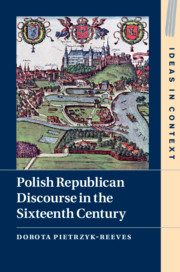Book contents
- Polish Republican Discourse in the Sixteenth Century
- Ideas in Context
- Polish Republican Discourse in the Sixteenth Century
- Copyright page
- Contents
- Acknowledgements
- Note on the Translation
- Introduction
- Chapter 1 Polish Sixteenth-Century Political Thought in Context
- Chapter 2 The Commonwealth (res publica)
- Chapter 3 Virtue and the Common Good
- Chapter 4 Mixed Constitution and the Institutional Foundations of the Commonwealth
- Epilogue
- Glossary of Polish Terms
- Bibliography
- Index
- Ideas in Context
Chapter 1 - Polish Sixteenth-Century Political Thought in Context
Published online by Cambridge University Press: 02 April 2020
- Polish Republican Discourse in the Sixteenth Century
- Ideas in Context
- Polish Republican Discourse in the Sixteenth Century
- Copyright page
- Contents
- Acknowledgements
- Note on the Translation
- Introduction
- Chapter 1 Polish Sixteenth-Century Political Thought in Context
- Chapter 2 The Commonwealth (res publica)
- Chapter 3 Virtue and the Common Good
- Chapter 4 Mixed Constitution and the Institutional Foundations of the Commonwealth
- Epilogue
- Glossary of Polish Terms
- Bibliography
- Index
- Ideas in Context
Summary
This chapter introduces the historical and political context for the analysis of the Polish republican discourse, including the constitutional arrangements of the Polish Kingdom and the rise of humanism in the fifteenth century. It presents the institutional background for the republican discourse that was provided by the rise of parliamentarism and several charters of rights and privileges issued by Polish kings in the fourteenth and fifteenth centuries. These developments greatly contributed to the growing role of active citizenship and the vision of a free commonwealth. Not only was the Polish Kingdom in the fifteenth century not becoming more centralised and absolutist, but it was heading towards an elective parliamentary monarchy within the Jagiellonian dynasty, with a growing role for the representative body of the Sejm. This alone was a fertile ground for the emergence of a republican discourse of liberty and res publica. The chapter also discusses how Renaissance humanism and its studia humanitatis opened up the Polish culture to the influence of Platonism, Aristotelianism, rhetoric and the interpretation of the works of Cicero, often mixed with elements of the scholastic tradition.
Keywords
- Type
- Chapter
- Information
- Polish Republican Discourse in the Sixteenth Century , pp. 18 - 49Publisher: Cambridge University PressPrint publication year: 2020

